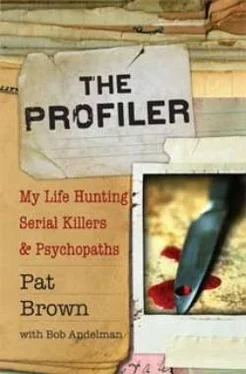Pat Brown - The Profiler - My Life Hunting Serial Killers & Psychopaths
Здесь есть возможность читать онлайн «Pat Brown - The Profiler - My Life Hunting Serial Killers & Psychopaths» весь текст электронной книги совершенно бесплатно (целиком полную версию без сокращений). В некоторых случаях можно слушать аудио, скачать через торрент в формате fb2 и присутствует краткое содержание. Жанр: Триллер, на английском языке. Описание произведения, (предисловие) а так же отзывы посетителей доступны на портале библиотеки ЛибКат.
- Название:The Profiler: My Life Hunting Serial Killers & Psychopaths
- Автор:
- Жанр:
- Год:неизвестен
- ISBN:нет данных
- Рейтинг книги:5 / 5. Голосов: 1
-
Избранное:Добавить в избранное
- Отзывы:
-
Ваша оценка:
The Profiler: My Life Hunting Serial Killers & Psychopaths: краткое содержание, описание и аннотация
Предлагаем к чтению аннотацию, описание, краткое содержание или предисловие (зависит от того, что написал сам автор книги «The Profiler: My Life Hunting Serial Killers & Psychopaths»). Если вы не нашли необходимую информацию о книге — напишите в комментариях, мы постараемся отыскать её.
The Profiler is fascinating in many respects, not the least of which is that it lifts the veil of misconception that the news media and entertainment industry have created and reveals criminal profiling for what it actually is-an analysis of physical and behavioral evidence that is utilized to form the most scientific determination as to how a crime occurred and what type of person it was that committed it. Rather than individuals who physically track down and confront cold-blooded killers while coping with the demons that come with such a dangerous profession, profilers are generally behind-the-scenes thinkers who analyze and recreate scenarios, often years after the cases have gone cold-and often while being met with the resistance and/or indifference of the authorities.
Readers will be intrigued by Brown’s case files, many of which she reveals in the book. Along with a history of each crime, she chronicles the origins of her involvement in the case (most often by request of the victim’s family), the official police investigation and its conclusions, and her own thought process as to how the crime occurred-often the result of a reenactment of the crime, typically staged with the help of her good-natured children. She then lists her suspects, exploring the veracity of each supposition, and ultimately identifies the one person that she most strongly feels is guilty. (Some names and identifying characteristics have been changed to protect the identity of individuals discussed in the book.)
What is shocking is that nearly every case discussed in The Profiler has gone officially unsolved. Even in the instances where there is clear and compelling evidence of guilt, factors such as politics, economics, and/or the lack of available resources tend to thwart justice. This is a source of outrage to Brown, and it should inspire an equally incredulous response from readers. One of the greatest triumphs of the book is that it portrays a criminal justice system that fails much more often than we know, or would care to admit. And while this may indeed be a scary prospect, it is one that needs to be brought to light if reform is going to happen.
Almost conversational in tone, The Profiler is the rare book that takes a complex topic and simplifies, rather than compounds, its mystique. Brown has a distinct voice, which discernibly captures moments of despair, humor, and levity, and she proclaims her opinions boldly and without reservation. Just as she willingly admits that much of her job is reliant on common sense, readers should be equally forthcoming in recognizing that common sense is woefully underutilized, underappreciated, and underdeveloped. And that is a crime that affects all of us…












